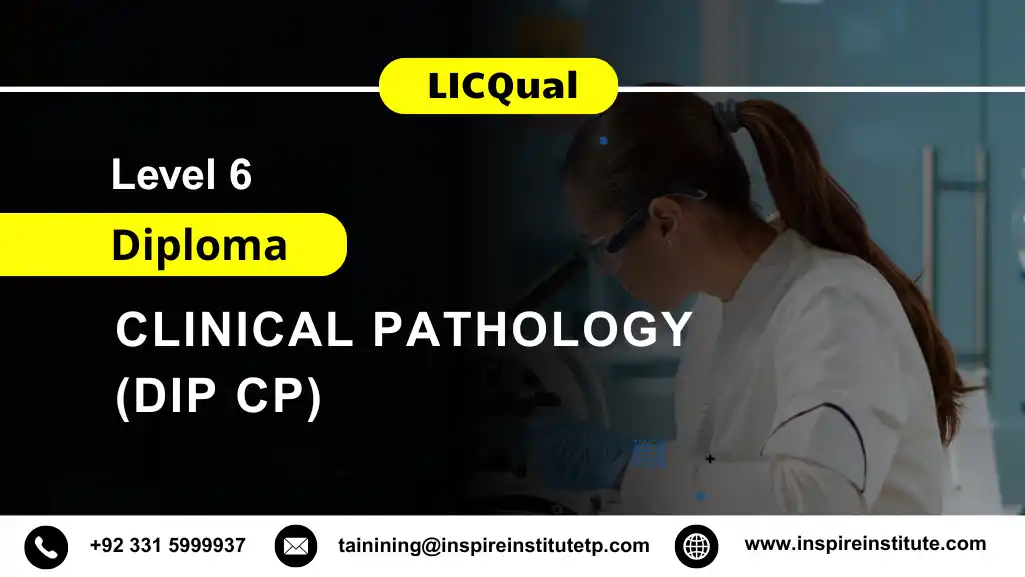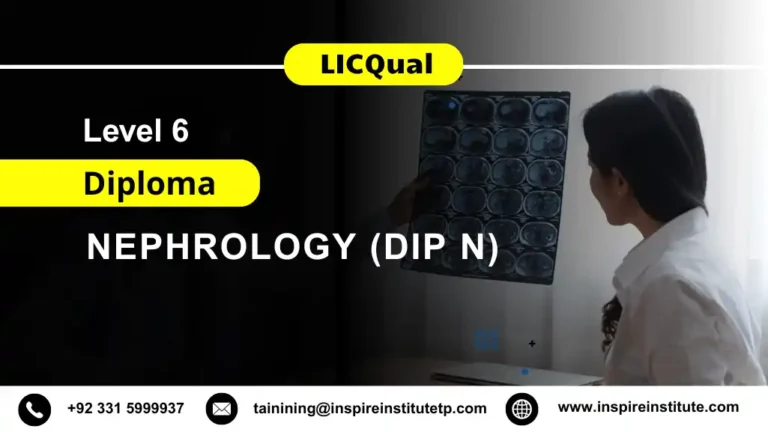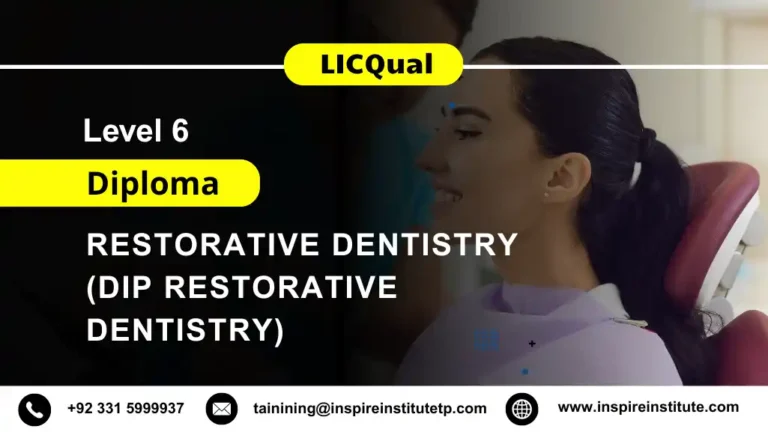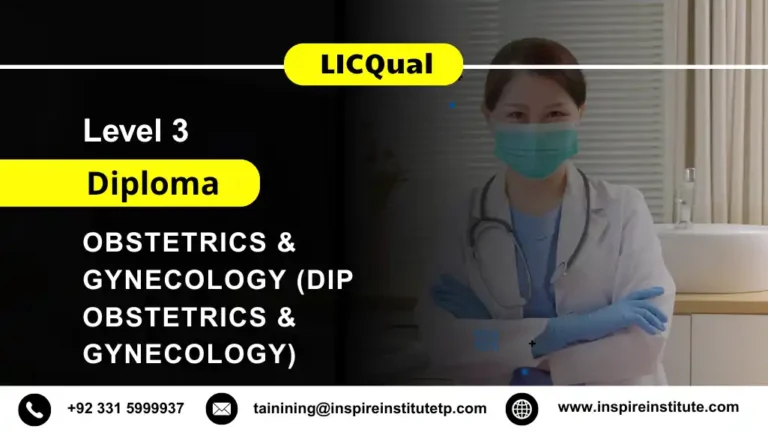LICQual Level 6 Diploma in Clinical Pathology (Dip CP)
The LICQual Level 6 Diploma in Clinical Pathology (Dip CP) is a prestigious UK-accredited qualification designed for healthcare professionals, laboratory technologists, and biomedical science practitioners who aspire to advance their careers in medical diagnostics and laboratory medicine. Clinical pathology is a cornerstone of modern healthcare, providing essential data that drives accurate diagnosis, treatment planning, and patient management. This course equips learners with in-depth knowledge and analytical skills to interpret laboratory results and contribute to clinical decision-making effectively.
The Diploma in Clinical Pathology offers a comprehensive curriculum that covers hematology, microbiology, clinical biochemistry, immunology, and molecular diagnostics. Learners gain an understanding of how diseases affect human biology at the molecular and cellular levels, as well as how laboratory testing contributes to identifying, monitoring, and managing these conditions. This qualification prepares students to integrate scientific principles with real-world clinical applications, ensuring accuracy and excellence in healthcare diagnostics.
The course also highlights the importance of quality assurance, ethical practice, and laboratory safety within medical environments. Learners are trained to uphold international laboratory standards, ensuring reliability, accuracy, and integrity in test results. This focus on ethical and professional conduct makes graduates valuable assets to hospitals, diagnostic laboratories, and research institutions worldwide.
Why Choose this Qualification
The LICQual Level 6 Diploma in Clinical Pathology (Dip CP) is a globally recognised and UK-accredited qualification designed for healthcare professionals and laboratory specialists who aim to excel in the field of diagnostic medicine. This course combines theoretical excellence with practical training, equipping learners with the skills to analyse clinical samples, interpret laboratory data, and support evidence-based medical decisions. Through a rigorous and structured learning approach, the programme prepares participants to meet the growing global demand for competent professionals in clinical diagnostics and pathology.
Key Reasons to Choose this Qualification
Advanced Scientific Knowledge
Learners gain an in-depth understanding of clinical pathology, including biochemistry, microbiology, haematology, and molecular diagnostics.
• Develop expertise in analysing the biochemical and cellular mechanisms of diseases.
• Understand laboratory techniques for detecting and monitoring health conditions.
• Learn to apply pathophysiological principles in diagnostic evaluations.
• Gain comprehensive insights into interpreting laboratory results for clinical decision-making.
Practical Laboratory Competence
This qualification strengthens hands-on laboratory skills through practical assignments and case-based learning.
• Acquire proficiency in sample collection, preparation, and analysis.
• Apply advanced diagnostic tools and testing procedures with precision.
• Learn laboratory safety standards and quality assurance protocols.
• Enhance problem-solving and analytical thinking in clinical laboratory environments.
Recognised and Accredited Qualification
The LICQual Level 6 Diploma in Clinical Pathology is a UK-accredited and internationally recognised credential.
• Validate your professional expertise in clinical and laboratory medicine.
• Meet international healthcare and diagnostic standards.
• Improve your professional credibility within hospitals and research institutions.
• Gain eligibility for advanced postgraduate studies or international job placements.
Evidence-Based Diagnostic Approach
The course emphasises scientific research and data-driven diagnostic reasoning.
• Learn to integrate laboratory findings with clinical evidence for accurate diagnoses.
• Evaluate research studies and medical reports critically.
• Apply validated testing protocols and diagnostic methods.
• Strengthen your ability to interpret results within a clinical context.
Flexible and Accessible Learning
Designed for working professionals, the Diploma in Clinical Pathology offers flexible, assignment-based learning.
• Study at your own pace without disrupting professional responsibilities.
• Access digital learning resources and expert guidance online.
• Participate in self-directed research and practical assessments.
• Maintain a healthy balance between study, work, and career progression.
Career Enhancement Opportunities
Graduates gain access to diverse roles across clinical, research, and public health sectors.
• Pursue positions such as Clinical Pathologist, Medical Laboratory Scientist, or Diagnostic Officer.
• Expand your career in hospitals, diagnostic centres, or academic research.
• Strengthen your profile for leadership or consultancy roles in laboratory medicine.
• Build a strong foundation for continuous professional development.
Contribution to Global Healthcare Standards
This qualification equips learners to improve healthcare diagnostics and patient outcomes worldwide.
• Implement ethical and evidence-based laboratory practices.
• Promote quality management and accuracy in diagnostic services.
• Contribute to public health through early disease detection and prevention.
• Support sustainable and efficient medical laboratory systems globally.
Personal and Professional Development
The course develops critical thinking, leadership, and communication skills essential for professional success.
• Build confidence in clinical reasoning and diagnostic interpretation.
• Strengthen collaboration and teamwork within multidisciplinary settings.
• Enhance research, analytical, and decision-making capabilities.
• Develop lifelong learning skills for continued professional growth.
The LICQual Level 6 Diploma in Clinical Pathology (Dip CP) is more than a qualification—it is a gateway to excellence in diagnostic medicine and laboratory science. It empowers professionals to make meaningful contributions to healthcare, improve patient safety, and lead with integrity in the evolving landscape of clinical pathology.tric practice worldwide.
Course Overview
LICQual UK Awarding Body
Average Completion Time:
6-24 Months
Study Units: 6 Units
Evidence & Assignment Based
Mandatory Units
Who Should Take This Course
The LICQual Level 6 Diploma in Clinical Pathology (Dip CP) is designed for healthcare professionals, laboratory scientists, and aspiring diagnostic specialists who want to enhance their expertise in clinical pathology and laboratory medicine. This programme provides a comprehensive understanding of disease mechanisms, laboratory techniques, and diagnostic interpretation, equipping learners with both theoretical knowledge and practical skills required for excellence in modern healthcare. It is suitable for those aiming to advance their careers, improve diagnostic accuracy, and contribute to better patient outcomes.
This course is suitable for
Medical Laboratory Scientists
• Gain advanced knowledge in biochemistry, haematology, microbiology, and molecular diagnostics.
• Develop practical skills for handling, analysing, and interpreting clinical samples.
• Learn quality assurance protocols and laboratory safety standards.
• Enhance diagnostic accuracy and contribute effectively to patient care decisions.
• Apply evidence-based approaches to laboratory testing and result interpretation.
Pathologists and Clinicians
• Deepen understanding of disease mechanisms and laboratory correlations.
• Improve skills in integrating lab results into clinical decision-making.
• Enhance competence in interpreting complex diagnostic data.
• Strengthen knowledge of pathology principles applicable to patient management.
• Support multidisciplinary teamwork for accurate disease diagnosis and treatment planning.
Healthcare Professionals
• Gain insights into laboratory processes and diagnostic workflows.
• Enhance ability to communicate findings effectively with laboratory teams.
• Learn to evaluate clinical data in alignment with laboratory evidence.
• Develop analytical and problem-solving skills in medical diagnostics.
• Improve patient care through evidence-based diagnostic knowledge.
Research Scientists
• Acquire skills in experimental design, sample analysis, and laboratory documentation.
• Develop competence in analysing clinical data and reporting results.
• Understand advanced molecular and diagnostic techniques.
• Strengthen ability to conduct reproducible and high-quality research.
• Apply scientific findings to improve diagnostic strategies and clinical practice.
Hospital and Clinic Managers
• Understand laboratory operations and quality management processes.
• Learn to implement policies that ensure accuracy, safety, and efficiency.
• Develop skills in supervising technical staff and workflow optimisation.
• Apply knowledge to enhance service delivery in hospital or clinic laboratories.
• Support strategic decision-making based on laboratory data.
Students and Graduates in Biomedical Sciences
• Build a strong foundation in clinical pathology for career progression.
• Gain practical experience in laboratory techniques and diagnostic analysis.
• Learn to interpret and apply scientific research to clinical contexts.
• Prepare for postgraduate studies or specialised training in pathology.
• Strengthen employability in healthcare, research, and diagnostic settings.
Public Health Professionals
• Develop understanding of laboratory diagnostics for population health monitoring.
• Learn to interpret epidemiological data alongside laboratory results.
• Gain knowledge of infectious disease testing, prevention, and control.
• Apply laboratory insights to public health policy and interventions.
• Improve decision-making and program implementation using diagnostic data.
Professionals Seeking Career Advancement
• Enhance credentials with a UK-accredited and internationally recognised qualification.
• Develop leadership, analytical, and technical skills for career growth.
• Open opportunities for advanced roles in hospitals, laboratories, or research institutions.
• Increase expertise in evidence-based diagnostic practices.
• Gain a competitive edge in clinical pathology and medical diagnostics sectors.
The LICQual Level 6 Diploma in Clinical Pathology (Dip CP) is ideal for professionals and graduates committed to excellence in diagnostic medicine and laboratory science. By enrolling in this programme, learners gain specialised knowledge, hands-on skills, and globally recognised credentials that enhance career prospects, improve patient care, and contribute to the advancement of healthcare services worldwide.alth on both national and global levels.
Course Benefits
The LICQual Level 6 Diploma in Clinical Pathology (Dip CP) is a UK-accredited qualification designed for healthcare professionals, laboratory scientists, and aspiring diagnostic specialists who wish to advance their expertise in clinical pathology and laboratory medicine. This comprehensive, assignment-based diploma integrates theoretical knowledge with practical applications, enabling learners to understand disease mechanisms, laboratory techniques, and diagnostic interpretation. Through evidence-based learning and flexible study pathways, this qualification prepares professionals to enhance diagnostic accuracy, improve patient outcomes, and contribute to the advancement of modern healthcare.
Key Benefits of the Course
Specialist Knowledge:
- Gain in-depth understanding of clinical pathology principles, including haematology, biochemistry, microbiology, and immunology.
- Explore advanced diagnostic techniques, laboratory safety, and quality management systems.
- Develop expertise in interpreting laboratory results in clinical contexts.
- Study disease mechanisms, pathophysiology, and molecular diagnostics to improve patient care.
- Build a strong foundation for specialised roles in laboratory and diagnostic medicine.
Practical Application:
- Develop hands-on skills through case studies, lab simulations, and practice-based assignments.
- Enhance the ability to process, analyse, and interpret clinical samples accurately.
- Apply evidence-based approaches to laboratory diagnostics for real-world healthcare scenarios.
- Strengthen collaboration with clinical teams for integrated patient management.
- Implement laboratory protocols and procedures to ensure accurate and safe diagnostics.
Recognised Qualification:
- Earn a UK-accredited diploma that validates professional knowledge and practical competence.
- Gain an internationally recognised credential that meets global standards in laboratory medicine.
- Enhance employability across hospitals, diagnostic laboratories, and research institutions.
- Open pathways for postgraduate studies or specialised clinical pathology training.
- Establish credibility as a highly skilled professional in laboratory diagnostics.
Flexible Learning Pathway:
- Study at your own pace with an assignment-based structure suitable for working professionals.
- Access digital learning materials, interactive resources, and expert mentorship.
- Balance career responsibilities while pursuing advanced academic development.
- Progress through modules while strengthening both theoretical and practical skills.
- Benefit from a supportive and adaptable learning environment tailored to individual needs.
Evidence-Based Training:
- Engage with the latest research, clinical guidelines, and diagnostic standards.
- Develop the ability to critically analyse laboratory data and scientific literature.
- Implement validated diagnostic techniques to improve accuracy and patient outcomes.
- Gain skills in quality assurance and laboratory best practices.
- Apply research-driven insights to real-world clinical pathology scenarios.
Career Development:
- Expand career opportunities in hospitals, diagnostic laboratories, research institutions, and healthcare organisations.
- Prepare for roles such as Clinical Pathologist, Laboratory Manager, Research Scientist, or Diagnostic Specialist.
- Enhance eligibility for postgraduate studies and specialised training programs.
- Strengthen your professional profile with a globally recognised qualification.
- Gain the expertise needed to lead and innovate in laboratory medicine.
Enhanced Healthcare Impact:
- Learn to implement accurate, ethical, and efficient diagnostic strategies.
- Contribute to improved patient care through reliable and timely laboratory results.
- Support clinical decision-making with evidence-based diagnostic insights.
- Promote safety, quality, and efficiency in healthcare diagnostics.
- Make a measurable impact on public health and patient outcomes.
Professional Growth:
- Develop leadership, analytical, and problem-solving skills in laboratory settings.
- Strengthen critical thinking, decision-making, and research capabilities.
- Enhance confidence and competence as a clinical pathology professional.
- Foster interdisciplinary collaboration with healthcare teams.
- Emerge as a skilled, ethical, and innovative professional committed to advancing diagnostic medicine.
The LICQual Level 6 Diploma in Clinical Pathology (Dip CP) empowers professionals to excel in laboratory diagnostics, combine theoretical knowledge with practical expertise, and earn a globally recognised credential. This qualification enhances career prospects, advances clinical excellence, and contributes to improved healthcare outcomes worldwide.
Eligibility Criteria
The LICQual Level 6 Diploma in Clinical Pathology (Dip CP) is a UK-accredited qualification designed for healthcare professionals, laboratory scientists, and aspiring diagnostic specialists who aim to enhance their knowledge and practical expertise in clinical pathology. This assignment-based diploma integrates theoretical foundations with real-world laboratory applications, preparing learners to analyse, interpret, and report diagnostic results effectively while contributing to improved patient outcomes.
Educational Background:
Applicants should hold a recognised qualification in medicine, biomedical sciences, healthcare, or a related laboratory discipline. A Level 5 diploma or equivalent qualification in clinical pathology, medical laboratory science, or health sciences may also be accepted. Candidates with international degrees in healthcare or laboratory sciences will be evaluated individually to determine eligibility and equivalence to UK standards.
Professional Experience:
A minimum of one year of experience in healthcare, clinical laboratories, diagnostic services, or a related field is recommended. Previous exposure to laboratory procedures, sample analysis, or diagnostic reporting provides an advantage. Motivated applicants with a strong interest in pathology, laboratory management, or diagnostic medicine—regardless of direct experience—are encouraged to apply.
Age Requirement:
Applicants must be at least 18 years old at the time of enrolment. This ensures learners possess the maturity, professional responsibility, and ethical understanding necessary for advanced study and practical application in clinical pathology.
Language Proficiency:
As the programme is delivered entirely in English, learners must demonstrate proficiency in reading, writing, and communication. A minimum IELTS score of 6.0 or an equivalent qualification is recommended for non-native English speakers to ensure effective participation in assignments, laboratory discussions, and assessments.
Technical Requirements:
Learners should have access to a computer or laptop with a reliable internet connection to participate in online learning, access study materials, and submit assignments. Basic computer literacy, including research, data analysis, document preparation, and communication tools, is essential for success in this programme.
Required Documents:
Applicants are required to submit the following documents during registration:
A valid ID card or passport for identity verification.
Academic transcripts or certificates of previous qualifications.
Proof of professional experience in healthcare, laboratory, or diagnostic services (if applicable).
The LICQual Level 6 Diploma in Clinical Pathology (Dip CP) equips professionals with advanced knowledge, practical skills, and internationally recognised credentials, enabling them to excel in clinical diagnostics, laboratory management, and healthcare improvement worldwide.
The Qualification Process
LICQual Level 6 Diploma in Clinical Pathology (Dip CP) follows a structured pathway to ensure learners gain comprehensive knowledge, practical skills, and professional competence in community oral healthcare.
Step 1: Self-Assessment
Learners review the entry requirements to confirm eligibility. Candidates with a background in dentistry, oral health, or public health are encouraged to apply.
Step 2: Registration
Complete the registration process by submitting required documents such as proof of qualifications, a valid ID, and payment of enrollment fees.
Step 3: Induction
An induction session is conducted to:
- Verify learner eligibility and documentation.
- Introduce study materials, learning outcomes, and assessment procedures.
Step 4: Learning and Evidence Submission
Learners complete assignments, case studies, and practical exercises demonstrating competence in public health dentistry, community oral health assessment, preventive strategies, and program planning.
Step 5: Feedback and Revision
Assessors review submitted evidence and provide constructive feedback. Learners can revise and resubmit work to meet all required standards.
Step 6: Competence Validation
Final submissions are evaluated to confirm that learners have met all theoretical and practical learning outcomes.
Step 7: Internal Quality Assurance (IQA)
The IQA team reviews the assessment process to ensure accuracy, fairness, and compliance with international standards.
Step 8: External Verification (EQA)
External verifiers validate the authenticity and quality of learner achievements.
Step 9: Certification
Upon successful verification, learners are awarded LICQual Level 6 Diploma in Clinical Pathology (Dip CP) , demonstrating advanced proficiency in community oral healthcare and preparing them for professional growth in dental public health, preventive dentistry, and healthcare policy.







